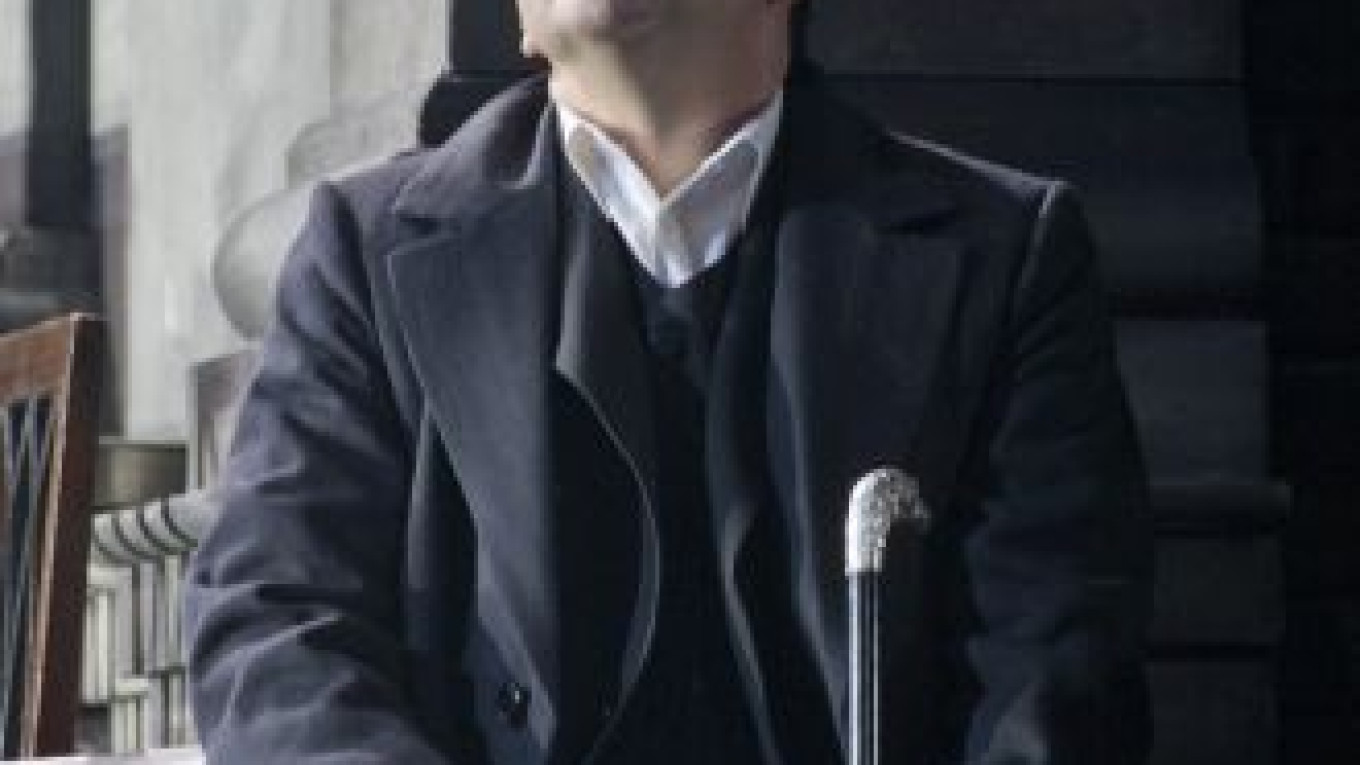The famous designation of Alexander Pushkin's "Eugene Onegin" as an "encyclopedia of Russian life" can sound a bit timeworn these days. But it was this very phrase, coined some 175 years ago by Russian literary critic Vissarion Belinsky, that kept running through my head as I recently watched Rimas Tuminas' extraordinary dramatization of Pushkin's novel in verse unfold at the Vakhtangov Theater.
Rather than to Pushkin or "Onegin," however, I mean that in regards to the bold, sweeping and idiosyncratic vision that Tuminas brought to the novel. And the "encyclopedia" here is not of Russian life, per se, but is of one man's perception of Russia and what is Russian.
Tuminas, one of the leading directors of our time, is Lithuanian although his connections to Russia are deep. The son of a Russian mother, he studied directing in Moscow, and has been the artistic director of the Vakhtangov since 2007. All this gives him the perspective to see the Russian experience from unique angles — from inside and outside simultaneously.
In Russia, at least, no one need be reminded of the story that transpires in "Onegin." A rather smug young man from St. Petersburg languishes in the Russian countryside. Almost without thinking he rudely rebuffs the enchanting Tatyana who fell in love with him, and kills his friend, the poet Lensky, in a duel. Years later — surprise! — he regrets passing on Tatyana, but to no avail whatsoever.
As anyone can tell you, the story is not what's important, it's how it's told. And that is entirely true of Tuminas' rendition of it.
This production is often breathtaking, startling and unexpected. Tuminas cuts up the text, moves things around, leaves things out. He employs three Onegins, two Lenskies and a bevy of dancers from a girl's ballet school. An itinerant musician follows the action closely and occasionally participates, while a crazy white rabbit leads a frustrated hunter on a wild and mesmerizing chase in a snowstorm.
Much of this performance is "silent," the actors wordlessly informing entire scenes with only the accompaniment of compositions by Tchaikovsky, Shostakovich or the original music of Faustas Latenas. The latter's lightly pulsing musical themes are repetitive but evocative.
The set design by Adomas Jackovskis posits a few incidental objects in a wide open space. Individuals here are almost dwarfed by the size of things — two interior walls tower over them on either side of the stage, a coffin-like carriage swallows up an entire party of revelers accompanying Tatyana to Moscow. Against the back wall a huge hanging mirror sways gently, creating a sense of vertigo and skewed reality.
Tuminas filled this "Onegin" with striking images that play on superficial, sometimes anachronistic, clich??s about Russia — a blinding snowstorm, for example, or the constant appearance of graceful ballerinas. Going beneath the surface, he constructs a world inhabited by sensitive, thoughtful and resourceful women who endlessly encounter men who are pompous, thick-headed, unstable or blissfully ignorant.
When Tuminas' Onegin kills Lensky, it is no "polite" aristocratic duel. His Onegin approaches the hapless poet with his pistol and rams it into his gut as though he is stabbing him brutally with a knife.
The trio of Onegins (Sergei Makovetsky, Viktor Dobronravov and Maxim Sevrinovsky) represent phases of a man traversing the territory between self-important youth and jaded middle age. Tatyana (Vilma Kutaviciute) and her sister Olga (Maria Volkova) are vastly different in most ways, but similar in that they are strong. Olga is eccentric and outgoing. Tatyana, around whom everything revolves, is reserved, mysterious and utterly untainted by the world around her.
Tuminas embellishes the story throughout.
Tatyana's cigarette smoking nanny (Lyudmila Maksakova) doubles as the omnipresent ballet teacher whipping her charges into shape. A kind, but ghostly figure (Yulia Borisova) appears to Tatyana during an erotic dream and chastely narrates the dream. Reminding us of the wars that have ravaged Russian soil, a musician (Yekaterina Kramzina) waltzes with a legless soldier. Seven ballerinas on swings rise above the final ball like vestal virgins. Do they represent angels or sacrificial victims?
It's a question, of course, that should not be answered. The value of the image is in the multiple responses we have to the suggestive pictures Tuminas throws at us.
"Eugene Onegin" is a tour de force of imagination and execution. Encyclopedic or not, it is a remake of a classic work of literature that has all the hallmarks of a new masterpiece in new — this time, theatrical — clothing.
"Eugene Onegin" plays Sunday, Wednesday, and April 11, 18, 26 and 28 at 7 p.m. at the Vakhtangov Theater, located at 26 Ulitsa Arbat. Metro Smolenskaya. Tel. 499-241-1679. www.vakhtangov.ru. Running time: 3 hours, 45 minutes.
Contact the author at jfreedman@imedia.ru
Related articles:
A Message from The Moscow Times:
Dear readers,
We are facing unprecedented challenges. Russia's Prosecutor General's Office has designated The Moscow Times as an "undesirable" organization, criminalizing our work and putting our staff at risk of prosecution. This follows our earlier unjust labeling as a "foreign agent."
These actions are direct attempts to silence independent journalism in Russia. The authorities claim our work "discredits the decisions of the Russian leadership." We see things differently: we strive to provide accurate, unbiased reporting on Russia.
We, the journalists of The Moscow Times, refuse to be silenced. But to continue our work, we need your help.
Your support, no matter how small, makes a world of difference. If you can, please support us monthly starting from just $2. It's quick to set up, and every contribution makes a significant impact.
By supporting The Moscow Times, you're defending open, independent journalism in the face of repression. Thank you for standing with us.
Remind me later.


